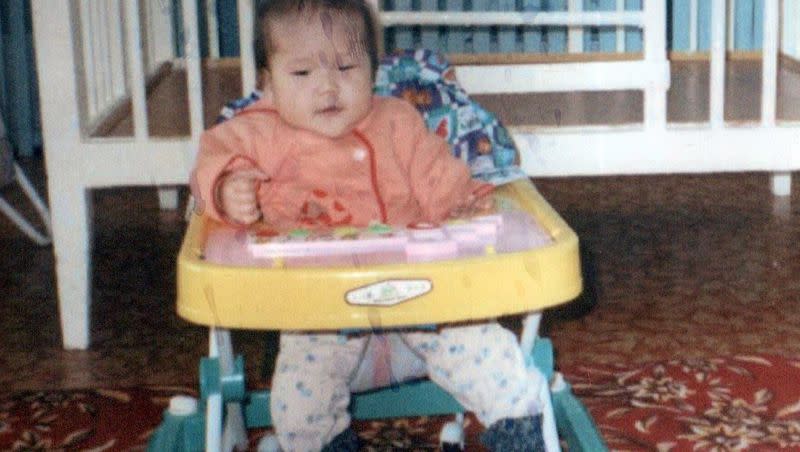Perspective: How 9/11 changed our international adoptions

- Oops!Something went wrong.Please try again later.
When I think of 9/11, I think of the relief I felt several weeks later when, after being picked up from the airport in Almaty, Kazakhstan, and taken into downtown, I saw flags hanging from balconies all over the city. American flags. I sank back into my seat, safe in the realization we were in friendly territory.
I was there to adopt two children, and I was filled with anxiety. Operation Enduring Freedom was launched on Oct. 7, 2001, in Afghanistan. Now it was the third week in October. Kazakhstan is in the general area of Afghanistan.
For me, 9/11 had started when my brother called me and told me World War III had started. I was on the computer working on some of the final paperwork for the international adoption.
I went running upstairs screaming at my husband to turn on the TV and watched the second plane plow into the World Trade Center tower. We continued watching until the towers collapsed. It was one of those moments of collective trauma seared into my memory.
Getting on a plane
Air travel was halted, then resumed slowly, especially international flights. We were delayed only a little bit, and in the third week of October, my husband and I took our 13-year-old daughter (who had been adopted from Kazakhstan in 1993) and our 21-month old daughter and headed to the airport. TSA didn’t even exist yet, but there was definitely enhanced security and random checks of carry-on bags. I was selected every time. We couldn’t even take nail clippers and definitely not cross-stitch projects. We had friends and family concerned that if we traveled so close to a “hot spot” and so soon after the 9/11 attacks, we would not come back.
Even though we were totally committed to our adoptions and were as prepared as we could be to deal with whatever situation we would find, I was unsure how tense the situation might be in Kazakhstan. Would they side with Afghanistan? Would they look at us askance? Would we be followed by mobsters, like I experienced with previous adoptions?
Related
That’s why those flags were such a relief.
Over and over, people apologized to us in broken English as they grasped our hands in earnestness, wanting to make us understand that they were also heartbroken at the events just six weeks earlier.
Getting our boys
From Almaty, we flew on a small plane to Pavlodar, up very near the border of Russia. If you’ve ever seen a bus crammed full of passengers, including squawking chickens and produce, you’ll have a good idea what the plane was like. Children didn’t need tickets, but they did need to sit on a lap. Even at 13. It was a unique experience.
After months of preparation and paperwork, we still had the legal process to complete in Kazakhstan. A homestudy can only share so much information, so I also brought along a very large scrapbook of our family goings-on during the previous year. We took that scrapbook with us into the first city office we went to and left it with the receptionist.
When we finally arrived at our official court date, that scrapbook was sitting on the table, right in front of the judge.
In the days between our arrival in Pavlodar and the finalization of our adoptions, we got to visit the boys. Kairat (now Kerry) was a cheerful 3-year-old with physical disabilities — and completely non-verbal. He had been parked in a crib in the middle of the baby room and mostly left alone.
Nariman (now Ammon) was 16 months old. When I held him for the first time, he sat on my lap and cried. He didn’t smile until the adoption was final and we took him back to our hotel. Then he grinned and grinned as he toddled around the room. We were not worried that he cried when he met us. In fact, we were pretty happy about it, because we knew it was a healthy response to meeting strangers.
By the time all the paperwork was finalized and we had received new birth certificates and Kazakh passports, we loaded the six of us into three airplane seats for the flight back to Almaty. I prayed hard that the tiny plane could actually lift off the ground, as I was pretty sure we exceeded the maximum weight.
Following an interview with the American consulate in Almaty, we flew to Moscow to get U.S. visas for our new children. Now into the third week in November, the temperature was a balmy 14 below zero. It’s the last time I was in Russia — and given world events, it might stay that way.
We landed back in Utah on Thanksgiving Day, 2001, most grateful to be back on U.S. soil with two new American citizens.
Sept. 11 will always be a day tinged with sadness for me, but there are happy memories, too, as the events of 9/11 will also be inextricably tied to the time Kerry and Ammon joined our family.
Holly Richardson is the editor of Utah Policy.

